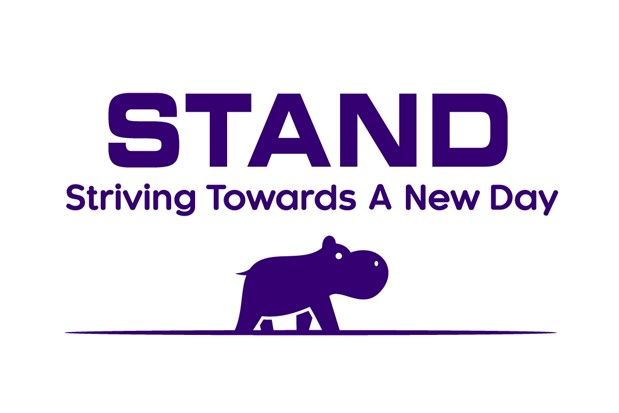STAND's members
What STAND means to group members
From a discussion between members at one of STAND’s weekly groups:
Gerry: STAND is a peer support group which is facilitated by people living with dementia and their families and we’re here to support people who are worried about dementia or might be going through the process of being diagnosed. Our ethos is to empower, not to entertain but to empower people living with dementia and to be the best that they want to be. We encourage them through using arts, for example, writing original sounds tracks, poetry, storytelling, art, photography, wellbeing.
Jacqui: I was a bit worried about coming because I didn’t know anybody here, and when I walked through the door, people said hi and asked me who I was and that actually helped me quite a lot, to feel that people were open.
I didn’t know what to expect when I came, I thought ‘what are these people going to be like? are they going to be able to hold a conversation?’. I had all these different things going through my head, even though I’ve got dementia I thought that.
Gerry: That’s why STAND is so important because it covers an area that nobody else really does. We take up that slack that’s required for people who are at the mild to moderate stage who are still quite coherent, can have discussions, can do activities if they want to which isn’t provided by any of the mainstream local authority or Alzheimer’s Scotland groups.
It's been a lifeline for me because it’s allowed me to speak to people who are going through the same process I’m going through. They know how I feel, I’m not judged, you can be yourself, it’s a safe space for you to be you. Its meant a great deal. Through STAND I’ve also been encouraged to do activism.
Jacqui: I like listening to other people’s stories and things like that. And I feel that by listening to other people I get a bit more of an understanding of what’s happening to me. Rather than just being at home and worrying all the time, thinking ‘what’s going to happen next? what else do I have to do?’.
Gerry: It depends what type of dementia you’ve got, but some of the medication won’t work anyway. It slows it down but it doesn’t cure it. But a lot of types of dementia, there isn’t medication for it. It’s how you live your life that extends it more and I’m a great believer in that: you keep in company of people, you talk with people, you have a laugh, you keep your mind active and do things. It will slow the disease down – it’s as simple as that. And the proof of the pudding was over covid, half the group went onto zoom and half the group didn’t and when we got back together, the half that kept on zoom were by far more healthy than the others that hadn’t been on zoom. There was quite a significant difference in their dementia journey
I would encourage people to come along, try it out – the group isn’t for everybody however if they come along for 2 or 3 weeks and they don’t enjoy it that’s fine, but they’ll probably find after 2 or 3 weeks they’re really enjoying it. All the decisions are made by the group, for the group and if you just want to come along and have a cup of tea and be in somebody’s company you’re more than welcome to do that as well, you don’t have to take part in all the activities, you can just come and sit and be in people’s company which is important as well.
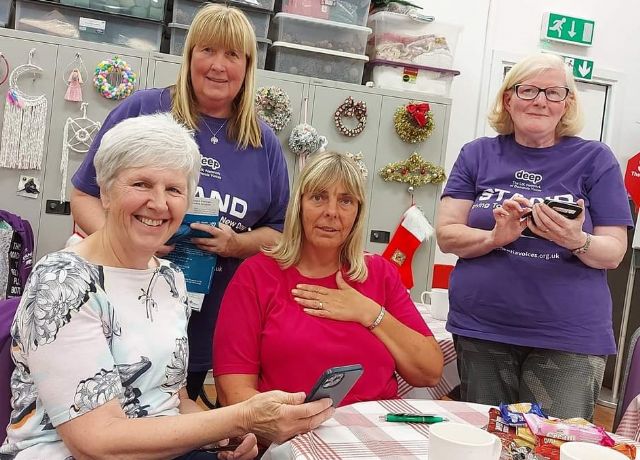
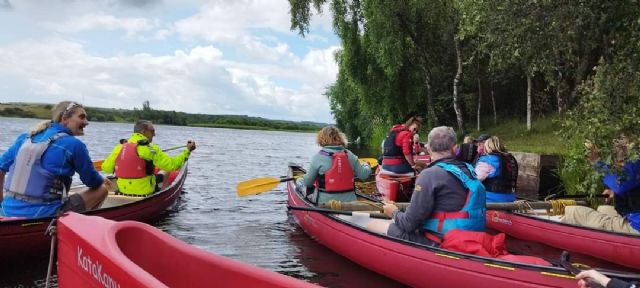
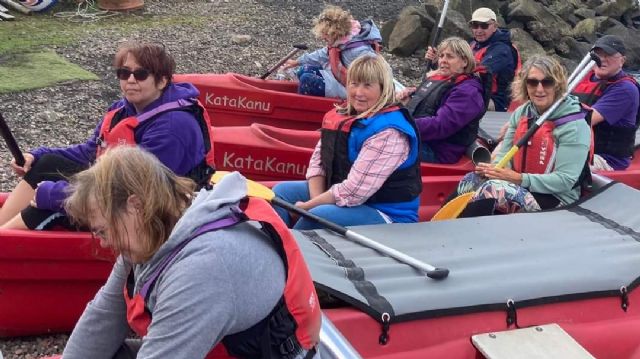
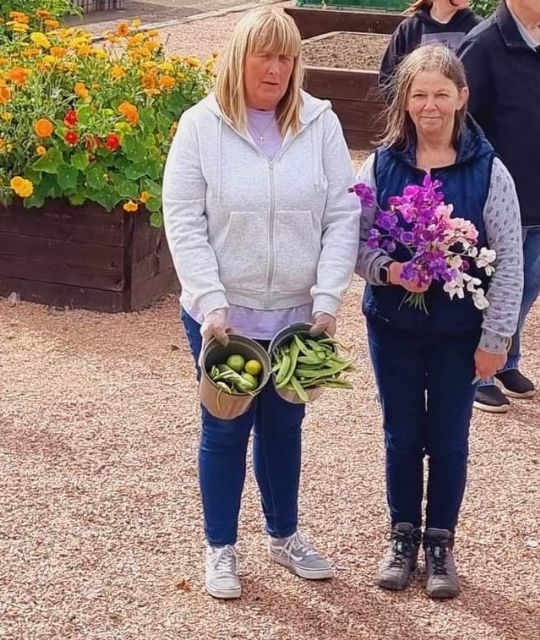
By group member Irene Donaldson: … the rooms are filled with laughter and a huge sense of being together and belonging. For me I have once again a peer group – folk just like me, yet individual and different, who are not phased by a diagnosis or a label and just want to get on and make the most of life. I have peers who share my hopes and fears from the same perspective as me and this is something I have missed. I do not feel judged and I’m not afraid of rejection. Allan enjoys the group and feels as I do that he is with kindred spirits and he does not feel the need to explain or justify anything but can be open and frank and knows he will be given any help, or guidance to help, that he needs.
In short our group has been a lifeline thrown to us at a time when we were both a bit “all at sea” and feeling increasingly isolated. We have made friends we trust and who we can meet up with outside the group meetings. Through the group I met Ruth who has afforded me so many opportunities to contribute to the wider community once more and the confidence to share my experiences. The group’s future lies mainly in our own hands now as we have equal partnerships with all involved in how we move ahead. I have a sense of purpose and self respect once more. Exciting times ahead! |
Gerald King writes: We are a group that accepts each other for who we are, we do not judge, we are kind and considerate towards each other. I am in no doubt that we all share the same fears for what the future will bring however, you would not think so when you look around the group and see all those smiling and laughing faces looking back at you. That itself speaks volumes for what the group means to it’s members.
I can’t speak for others, but what I do know is that on personal level, having Young Onset Alzheimer’s disease can be a very lonely place indeed. Loss of work, loss of peers/work colleagues, loss of self respect/worth/esteem, the list seems endless sometimes. This group has however shed a new beam of light on my life at a time that all I could see was darkness. It has afforded me the honour and privilege of meeting a new group of friends who truly understand what it is like to be living with Dementia and who in all honesty have made me smile again, both inside and outside.
Oh, and may I point out that the group has been exceptionally rewarding for my wife Trisha who feels that she is truly amongst her peers and who offer her the same kindness, friendship, support and guidance that she needs during both our journeys. |
Group member Willy writes: It felt like coming home, the first time I met the folk in STAND. To say that being diagnosed with Alzheimer’s during lockdown was strange would be an understatement. It left me baffled and bewildered, confused to have this new label, anxious about weird symptoms, not really knowing where to turn.
It’s hard now to describe my sense of relief in meeting people like me. Not exactly like me, of course – but people who until very recently were in work, raising families, being active members of society until Dr Dementia came calling.
At one level there’s a fair bit of us sitting chatting over tea and biscuits. But listen to the conversations – folk are talking about getting fit, about welfare benefits, about personal safety, about housing.
And there’s no need for anyone to stand on ceremony. I don’t have to explain to other members of the group my anxiety about losing my driving licence. They know, they’ve been there, they’ve got the T shirt. It feels just like growing a whole new family. |
